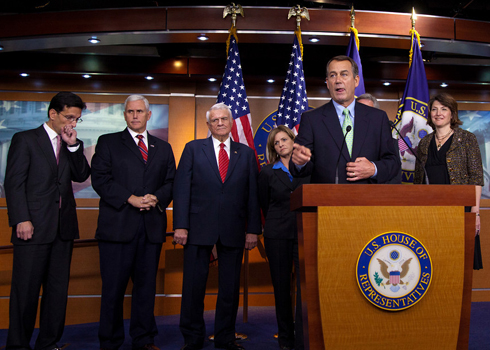House Republicans are turning to old friends on K Street to lead their legislative attempts to repeal the new health care law.
Three recently hired Republican aides — two set to work in senior positions on the powerful Energy and Commerce Committee, and one for soon-to-be Speaker John Boehner — spent the past years lobbying on behalf of insurance companies, pharmaceutical manufacturers, and other corporate interest groups with a vested interest in weakening or repealing the law.
Two weeks ago, incoming Energy and Commerce chair Fred Upton announced he’d hired Gary Andres to be his staff director.
“For over two decades, Gary has been a leading voice in Republican policy, always seeking solutions to advance our principles to limit the size and scope of government,” Upton said in a statement at the time.
Andres served as Vice Chairman of Public Policy and Research for Dutko Worldwide, where, according to congressional public disclosure forms, he lobbied for insurance giant UnitedHealth Group and for a corporate umbrella organization called the Coalition to Advance Healthcare Reform.
The coalition’s website is now defunct, but you can view an archive of its homepage here and of its membership here.
Ironically, the coalition’s principles match the architecture of the final health care law almost perfectly. According to a 2009 disclosure form filed before the legislation was written, the group
[a]dvocated for reforms consistent with the coalition’s five principles: 1) Market-based healthcare: a paradigm to fix the healthcare delivery system through transparency in healthcare cost and quality and utilization of electronic records and prescriptions; 2) Universal coverage with individual responsibility a system in which all Americans have access to coverage with shared responsibilities among the government, businesses, and individuals; 3) Financial assistance for low-income individuals: a way for low-income participants to be provided financial assistance for coverage rather than healthcare being provided as a free good; 4) Healthier behavior and incentives: a strategy to incorporate full care management for chronic conditions with financial healthy-behavior incentives; 5) Equal tax treatment: a means for individuals to purchase healthcare in the same tax-advantaged way businesses do.
Now Andres will be working to repeal a law that accomplishes precisely these things.
He’ll be joined on the Energy and Commerce staff by Howard Cohen, president of the health care lobbying firm HC Associates, who has lobbied for major health care trade associations including America’s Health Insurance Plans, PhRMA and the Federation of American Hospitals, as well as individual insurance and pharmaceutical companies.
Just across Independence Ave, Andres and Cohen will have a friend in Brett Loper, who as senior executive vice president at the Advanced Medical Technology Association was the medical device industry’s chief lobbyist. Loper led the losing fight to prevent Congress from assessing fees on device manufacturers to help finance the health care law.
There are probably more ardent foes of the health care law on K St, but if the goal is to unravel the law meticulously rather than in one fell swoop, it’s not a bad start to the line-up.










